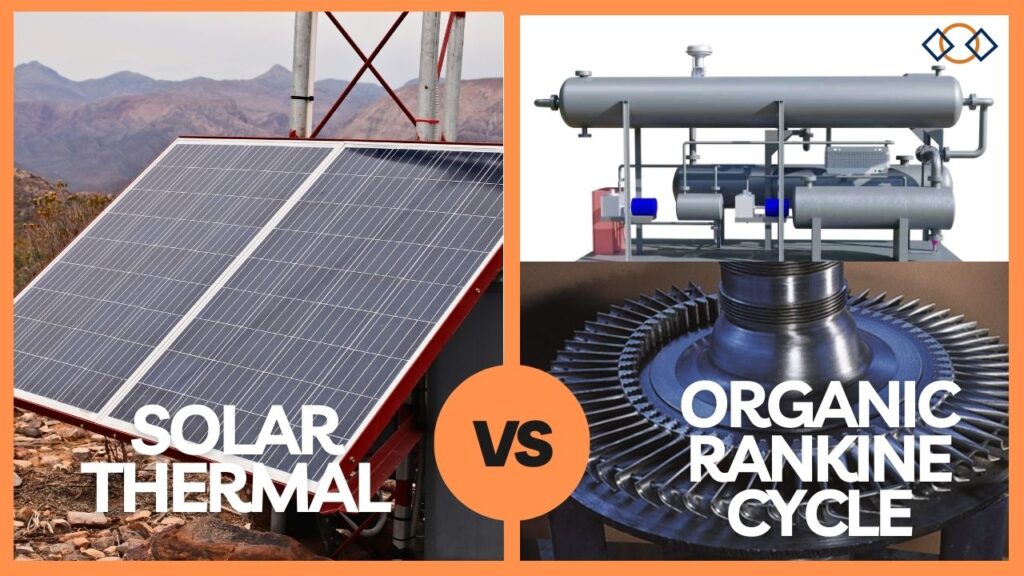
Are you still using Solar ? Understanding ORC vs. Solar Thermal: Choosing the Right Technology for Energy Efficiency
Understanding ORC vs. Solar Thermal, Choosing the Right Technology for Energy Efficiency , As industries around the world strive for sustainable operations, energy efficiency technologies are at the forefront of transformation. Two powerful solutions : Organic Rankine Cycle (ORC) systems and solar thermal technology , stand out in the race toward cleaner energy. While both play a role in reducing carbon footprints, they serve different purposes and are suited for specific applications. In this blog, we’ll dive into the key differences between ORC and solar thermal, helping you understand which technology may best serve your energy needs. What is the Organic Rankine Cycle (ORC)? The Organic Rankine Cycle (ORC) system is an innovative solution for converting low- to medium-temperature heat into electricity. Unlike traditional power generation that uses water as a working fluid, ORC uses organic fluids with lower boiling points, making it possible to harness heat that would otherwise be too low to use efficiently. Key Applications of ORC Advantages of ORC What is Solar Thermal Technology? Solar thermal technology, on the other hand, harnesses the sun’s energy to generate heat, which can be used directly in industrial processes or to produce steam for electricity generation. This technology often uses solar collectors that absorb sunlight and transfer the heat to fluids, which can then be used for various applications. Key Applications of Solar Thermal Advantages of Solar Thermal Comparing ORC and Solar Thermal: Key Differences While both ORC and solar thermal contribute to sustainability, they work in different ways and are suited for distinct scenarios. Feature ORC Systems Solar Thermal Systems Energy Source Waste heat, biomass, geothermal Sunlight Dependability Operates independently of sunlight Sunlight-dependent; storage needed for off-hours Temperature Range Effective starting from 150°C Works well with concentrated sunlight for high temperatures Primary Use Case Power generation from ORC Industrial/commercial heating or pre-heating Environmental Impact Reduces waste by utilizing excess heat Directly harnesses renewable solar energy Choosing Between ORC and Solar Thermal: Which is Right for You? When to Consider ORC Choose ORC if your operations produce waste heat that could be repurposed into electricity. ORC systems can help you tap into this resource, providing a continuous, weather-independent energy source. It’s especially beneficial for industries where heat is generated as a by-product, as it turns waste into value and significantly improves energy efficiency. When to Consider Solar Thermal If your facility is in a location with abundant sunlight, and your energy needs are mainly for heat (not electricity), then solar thermal technology may be the better choice. Solar thermal systems are particularly effective in sunny regions and for industries that can use heat directly during the day, such as food and beverage production, textiles, and drying processes. ORC and Solar Thermal: A Complementary Strategy In some cases, ORC and solar thermal can work together for greater efficiency. For example, solar thermal systems could handle peak heating needs during sunny hours, while ORC systems capture and repurpose any waste heat produced by other processes to generate additional power. This combination can create a more resilient, low-carbon energy system, especially useful for industries with variable energy needs. Are We Still Using Solar? Yes, solar thermal technology continues to be a highly relevant part of the energy mix, particularly for applications that benefit directly from renewable heat. While ORC offers advantages in waste heat recovery, solar is unmatched as a low-cost, carbon-free source for heating. Together, these technologies represent complementary tools in the broader move towards cleaner, more sustainable energy systems. Why ORC Could Be the Best Choice for Your Industry When it comes to energy efficiency and sustainability, both ORC and solar thermal systems offer distinct advantages. However, for industries aiming for high energy recovery from waste heat and consistent year-round performance, ORC systems stand out as an exceptional choice. While solar thermal systems are valuable in certain conditions, ORC technology provides unique benefits that make it a highly versatile solution. Key Benefits of ORC Systems Choosing ORC: A Step Toward Sustainable Energy Leadership In a world increasingly focused on sustainability, choosing ORC technology isn’t just about improving efficiency it’s a statement of environmental responsibility and innovation. By investing in ORC, companies position themselves as leaders in energy efficiency and resource optimization, setting a strong example in their industries. While solar thermal technology remains a valuable tool in the renewable energy toolkit, ORC offers unmatched benefits for industries looking to harness waste heat and achieve energy independence. By making ORC part of your energy strategy, you’re not only driving cost savings and environmental benefits but also future-proofing your operations in an energy-conscious world.
